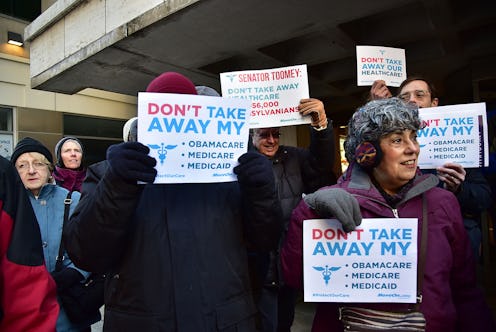News
Obamacare Signups Will Make Repeal Hard For Trump

Throughout the 2016 election, one of the most oft-repeated goals of Donald Trump, and a sentiment echoed by many other Republicans, was a promise to "repeal and replace Obamacare." Now that he and many of those Republicans are in office, that goal is looking closer to reality than ever before. Republicans are discussing a plan to immediately pass a bill repealing federal expenditures that make Obamacare possible, according to a report in the Washington Examiner, though they seem inclined to delay the implementation for a few years in order to come up with a replacement.
The reason that Republicans are pushing back the date of repeal (in addition to the lack of a clear plan of what will replace Obamacare) is that taking health care away from people would be an incredible shock to people, and probably politically unviable without an alternative that would allow sick people who rely on the program to stay covered without costing more than the current program. This is a serious issue to deal with, as more than 20 million people have gained health care through the Affordable Care Act, according to the Department of Health and Human Services.
That number is only becoming larger and making the prospect of repealing Obamacare more difficult. Federal officials announced on Wednesday that Obamacare enrollment for 2017 is up 400,000 people from last year at this point in the process: 6.4 million people have signed up, a record-breaking 670,000 of them on Dec. 15 alone. Not all of these people are new enrollees to the program — the government estimates about 2.1 million new customers, and many of the others are re-enrolling with different health care plans — but it still represents a large and growing involvement in the program.
This is especially notable not only in the midst of Trump's victory in conjunction with his promise to dismantle the law, but also with announced rate hikes a few months ago that make health care plans through the law more expensive. That so many Americans signed up anyway suggests that the law is still functioning even if it is more expensive than many of its enrollees want.
The issue is further complicated by who is enrolled on Obamacare. Areas where Trump did particularly well electorally also have a surprising tendency to also be the ones that have the highest Obamacare enrollment and the biggest drop in the uninsured rate since the passage of the law. Sarah Kliff wrote in Vox about her experiences talking to Kentucky residents who receive health care from the ACA but nevertheless voted for Trump:
I guess I thought that, you know, he would not do this, he would not take health insurance away knowing it would affect so many peoples lives,” says Debbie Mills, an Obamacare enrollee who supported Trump. “I mean, what are you to do then if you cannot pay for insurance?
With Republicans still unclear on what they're going to eventually replace Obamacare with, and the very real possibility that the delayed repeal plan could cause insurance providers to pull out of the market, there is reason for the massive number of people who get their health care through the 2010 health care law to be worried. And that number is growing, every day.